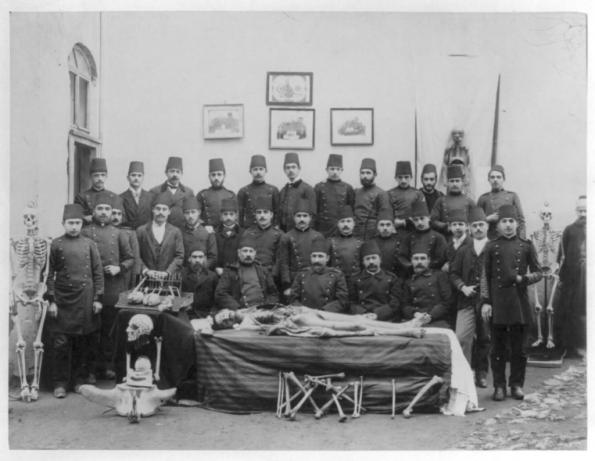Apr 11-12, 2019
Power in Medicine: Interrogating the Place of Medical Knowledge in the Modern Middle East
- Workshop
- Dept. III
Harnack-Haus, Ihnestr. 16-20, 14195 Berlin, Germany
Contact and Registration
The keynote lecture is public. To attend the workshop panels, registration is required: event_dept3@mpiwg-berlin.mpg.de by March 22, 2019.
The history of medicine has undergone a set of iterations often embedded within the history of ideas (Henry Sigerist, Owsei), sociology of knowledge (Thomas Kuhn), and cultural history (Charles Rosenberg). Since World War II, politics has been an explicit and implicit feature leading to conversations about biopower (Michel Foucault), feminism (Judith Leavitt), Orientalism (Edward Said), and colonialism (Anne Marie Moulin). The recent historiography of medicine has shifted as analytical categories within local and global contexts have disrupted along the lines of the local vs. the global, center vs. periphery, and “Western” vs.“non-Western.” During the past decade, numerous scholars of science, technology, and medicine in colonial and postcolonial societies have adopted circulation as a useful lens of analysis. Our workshop seeks to move beyond a false dichotomy between circulation and power by examining the trajectory of medicine in the modern Middle East.

Medical school in 19th century Ottoman Empire.
The Middle East has been and continues to feature within the global and globalizing processes insofar that it has been a site where capitalist, imperialist, and nationalist institutions have functioned as heuristics for power. We hope to look at the geographic transmission of medical knowledge from the late eighteenth century into the contemporary period. Medicine did not operate in isolation but was part of a shifting geospatial framework of the Ottoman Empire, European colonialism, and independent states. This workshop will unpack medicine and power by considering how the (re)production of medical knowledge and these local political formations dovetailed with broader global processes. Understanding how political and economic power operated within the framework of knowledge production and in the Middle East shows how knowledge migrated to proximate regions in Africa, Asia, and Europe.
Consequently, we hope that the workshop will investigate the production and circulation of medical knowledge, highlighting issues of translation, expertise, and mediation or competition between knowledge traditions. More broadly, we seek to probe the conditions of possibility of the globality of knowledge and its various formations. To that end, this workshop aims to make visible the transnational, intersecting, and dynamic histories of medicine and health in the modern Middle East and beyond. Second, we aim to respond to an ongoing trend in the study of science, technology, and medicine that depoliticizes knowledge and reinforces socially constructed boundaries between knowledge and society against which the field developed. By looking at the Middle East—a region disrupted by dynamics of imperialism, state formation, decolonization, the Cold War, civil wars, authoritarianism, popular uprisings, and mass immigration—we can better address the depoliticization and the archaeology of knowledge.
This workshop aims to explore diverse disciplinary backgrounds on topics such as the geography of disease, translation, sexology, psychiatry, labor, race, medical taxonomies, and medical technologies. Several issues will be addressed, notably: the production and circulation of medical knowledge, highlighting issues of translation, expertise, and mediation or competition between knowledge traditions. More broadly, we seek to probe the conditions of possibility of the globality of knowledge and its various formations. To that end, this workshop aims to make visible the transnational, intersecting, and dynamic histories of medicine and health in the modern Middle East and beyond.
The event will be convened by Europe in the Middle East—Middle East in Europe (EUME) and the Max Planck Institute for the History of Science (MPIWG) in Berlin, Germany. The workshop will examine the history and politics of medicine and psychiatry in the Middle East from the 1800s until the contemporary period. The abstract (below) provides some context to the research aims and vision of the workshop.
